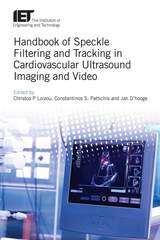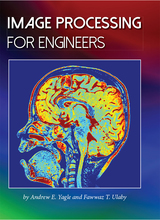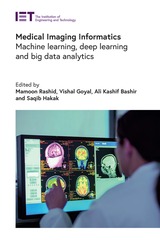7 books about Imaging Systems

Developments in Control Theory Towards Glocal Control
Li Qiu
The Institution of Engineering and Technology, 2012
Glocal control, a term coined by Professor Shinji Hara at The University of Tokyo, represents a new framework for studying behaviour of complex dynamical systems from a feedback control perspective. A large number of dynamical components can be interconnected and interact with each other to form an integrated system with certain functionalities. Such complex systems are found in nature and have been created by man, including gene regulatory networks, neuronal circuits for memory, decision making, and motor control, bird flocking, global climate dynamics, central processing units for computers, electrical power grids, the World Wide Web, and financial markets. A common feature of these systems is that a global property or function emerges as a result of local, distributed, dynamical interactions of components. The objective of 'glocal' (global + local) control is to understand the mechanisms underlying this feature, analyze existing complex systems, and to design and create innovative systems with new functionalities. This book is dedicated to Professor Shinji Hara on the occasion of his 60th birthday, collecting the latest results by leading experts in control theories to lay a solid foundation towards the establishment of glocal control theory in the coming decades.
[more]

Electrical Capacitance Tomography (ECT)
Principles, systems and industrial applications
Wuqiang Yang
The Institution of Engineering and Technology, 2025
Electrical capacitance tomography (ECT) is a non-invasive imaging technique that creates a cross-sectional image of the distribution of dielectric materials inside a pipe or vessel. ECT measures the capacitance between pairs of electrodes mounted on the outside, and reconstructs a cross-sectional image using the measured capacitance data and a suitable algorithm, to reflect the permittivity distribution within the object. The techniques is used to visualize the internal flow of non-conductive substances in industrial processes such as the chemical, oil and gas industries.
[more]

Fortressing Pixels
Information security for images, videos, audio and beyond
Subhrajyoti Deb
The Institution of Engineering and Technology, 2025
Emerging and pivotal technologies such as artificial intelligence and deep learning, cloud computing, internet of things, blockchain, encryption, and quantum cryptography are required to meet multimedia data's evolving needs and security requirements. In digital imaging, a pixel is the smallest element of an image that can be manipulated through software. Pixels within a digital image or graphical user interface must be secured to control unauthorized access or manipulation.
[more]

Handbook of Speckle Filtering and Tracking in Cardiovascular Ultrasound Imaging and Video
Christos P. Loizou
The Institution of Engineering and Technology, 2018
Ultrasound imaging technology has experienced a dramatic change in the last 30 years. Because of its non-invasive nature and continuing improvements in image quality, ultrasound imaging is progressively achieving an important role in the assessment and characterization of cardiovascular imaging. Speckle is inherent in ultrasound imaging giving rise to a granular appearance instead of homogeneous, flat shades of gray, as is visible and as such, speckle can severely compromise interpretation of ultrasound images, particularly in discrimination of small structures. On the other hand, speckle can be used in the detection of time varying phenomena, or tracking tissue motion. The objective of this book is to provide a reference edited volume covering the whole spectrum of speckle phenomena, theoretical background and modelling, algorithms and selected applications in cardiovascular ultrasound imaging and video processing and analysis. The book is organized under the following four parts, Part I: Introduction to Speckle Noise; Part II: Speckle Filtering; Part III: Speckle Tracking; Part IV: Selected Applications in Cardiovascular Imaging.
[more]

Image Processing for Engineers
Andrew E. Yagle and Fawwaz T. Ulaby
Michigan Publishing Services, 2018
[from the Preface] Designed for a course on image processing (IP) aimed at both graduate students as well as undergraduates in their senior year, in any field of engineering, this book starts with an overview in Chapter 1 of how imaging sensors—from cameras to radars to MRIs and CAT—form images, and then proceeds to cover a wide array of image processing topics. The IP topics include: image interpolation, magnification, thumbnails, and sharpening, edge detection, noise filtering, de-blurring of blurred images, supervised and unsupervised learning, and image segmentation, among many others. As a prelude to the chapters focused on image processing (Chapters 3–12), the book offers in Chapter 2 a review of 1-D signals and systems, borrowed from our 2018 book Signals and Systems: Theory and Applications, by Ulaby and Yagle.
[more]

Maritime Autonomous Vehicles
Methods and measurements
Frank Ehlers
The Institution of Engineering and Technology, 2025
The maritime domain is of an enormous interest to our society, from the economy to health, and security. Operating in the maritime domain, on the other hand, is dangerous, expensive, and most of the time at low execution speed. Unmanned systems are in many ways suited to such environments, but the successful realisation of maritime autonomous vehicles requires an overarching design and development cycle, starting from design and modelling of unmanned systems, to control and implementation exhibiting a reliable and explainable level of autonomy and self-organization amidst the sudden and possibly extreme disturbances occurring in the uncertain and dynamic maritime environment.
[more]

Medical Imaging Informatics
Machine learning, deep learning and big data analytics
Mamoon Rashid
The Institution of Engineering and Technology, 2024
Medical imaging informatics play an important role in the effectiveness of present-day healthcare systems. Advancement of artificial intelligence, big data analytics, and internet of things technologies contribute greatly to various healthcare applications. Artificial intelligence techniques are contributing to improvements with traditionally human-based systems and ensuring that the accuracy of prediction and diagnosis is being continually enhanced. The development of reliable and accurate healthcare models is becoming ever more possible with the help of machine learning and deep learning technologies. Artificial intelligence has the power to solve many complex problems in medical imaging and is a technology that will help to design the future of many healthcare systems.
[more]
READERS
Browse our collection.
PUBLISHERS
See BiblioVault's publisher services.
STUDENT SERVICES
Files for college accessibility offices.
UChicago Accessibility Resources
home | accessibility | search | about | contact us
BiblioVault ® 2001 - 2025
The University of Chicago Press









